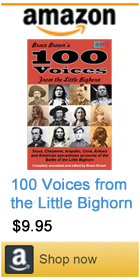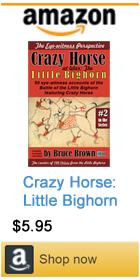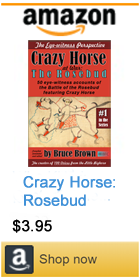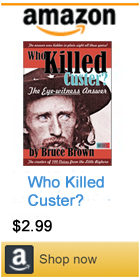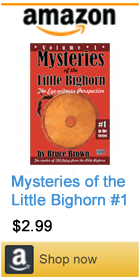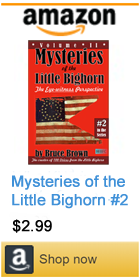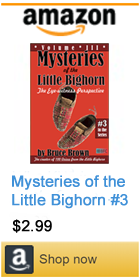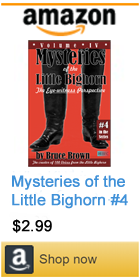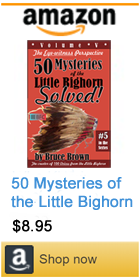|
||||||||||||
Bruce Brown's 100 Voices... He Dog Remembers Crazy Horse #1
HE DOG REMEMBERS CRAZY HORSE #1
I and Crazy Horse were both born in the same year and at the same season of the year. We grew up together in the same band, played together, courted the girls together, and fought together. I am now ninety-two years old, so you can figure out in what year he was born by your calendar. When we were seventeen or eighteen years old, we separated. Crazy Horse went to the Rosebud band of Indians and stayed with them for about a year. Then he came home. After he had been back for a while, I made inquiries about why he had left the Rosebud band. I was told he had to come back because he had killed a Winnebago woman. Less than a year after Crazy Horse left camp, I joined in a trip against the Crow Indians. When I got home, the crier was announcing that Crazy Horse was back in camp. Only his name was not Crazy Horse at that time. He had three names at different times of his life. His name until he was about ten years old was Curly Hair. Later, from the time he was ten until the time he was about eighteen years of age, he was called His Horse On Sight, but this name did not stick to him. When he was about eighteen years old, there was a fight with the Arapahos, who were up on a high hill covered with big rocks and near a river. Although he was just a boy, he charged them several times alone and came back wounded but with two Arapaho scalps. His father, whose name was Crazy Horse, made a feast and gave his son his own name., After that the father was no longer called by the name he had given away but was called by a nickname, Worm. Crazy Horse, the son, was one of three children. The oldest was a sister, the next was Crazy Horse, and the third was a brother [Little Hawk]: All are dead now. When we were young men, the Oglala band divided into two parts, one led by Red Cloud and one by Man-Afraid-of-His-Horse, the elder. I and Crazy Horse stayed with the part led by Man-Afraid-of-His-Horse. Later this half subdivided again into two parts. I stayed with the more northern half, of which I and Big Road, and later Holy Bald Eagle and Red Cloud, were appointed joint chiefs ("shirt-wearers," so called from a particular kind of ceremonial shirt worn by this class of chieftain as insignia of office). Crazy Horse remained with the southern quarter of the tribe. The council of this division awarded the chieftainship to Crazy Horse, American Horse, Young-Man-Afraid-of-His-Horse, and Sword. It was many years after our first battles before we were made chiefs. A man had to distinguish himself in many fights and in peace as well before he could be chosen as a chief. (Part of an interview held by John Colhoff with He Dog is inserted here because it bears on this subject. The material obtained through John Colhoff is in brackets.-E. H. H.) [The name of Crazy Horse's band was the Hunkpatila ("End-of-Circle") band because, when the tribe was encamped together, it occupied one end of the tribal crescent.] At about the time these appointments were made, Crazy Horse moved up toward the White Mountains (Indian name for the Big Horn Mountains). Crazy Horse and I went together on a war trip to the other side of the mountains. When we came back, the people came out of the camp to meet us and escorted us back and at a big ceremony presented us with two spears, the gift of the whole tribe, which was met together. These spears were each three or four hundred years old and were given by the older generation to those in the younger generation who had best lived the life of a warrior. [Crazy Horse was still single when he was made a "shirt-wearer." A few years after this he began to pay attention to the wife of a man named No Water. No Water did not want to let the woman go. In the battle "When They Chased the Crows Back to Camp," He Dog and Crazy Horse were the lance-bearers of the Kangi Yuha (Crow Owners' Society). About ten days after that battle Crazy Horse started on a smaller war expedition, and No Water's wife went along with him.] No Water followed them and came to the tipi of Bad Heart Bull and asked to borrow a certain good revolver which Bad Heart Bull owned. He said he wanted to go hunting. Crazy Horse and the woman were sitting by the fire in a tipi belonging to some of their friends. No Water entered the tipi, walked up to Crazy Horse as near as I am to that stove (about four feet) and shot him through the face. The bullet entered just below the left nostril. That is how Crazy Horse got his scar. No Water took his wife back. Because of all this, Crazy Horse could not be a "shirt-wearer" any longer. When we were made chiefs, we were bound by very strict rules as to what we should do and what not [to] do, which were very hard for us to follow. I have never spoken to any but a very few persons of what they made us promise then. I have always kept the oaths I made then, but Crazy Horse did not. Later on the older, more responsible men of the tribe conferred another kind of chieftainship on Crazy Horse. He was made war chief of the whole Oglala tribe. A similar office was conferred on Sitting Bull by the Hunkpapa tribe. This was still early, a long, long time before the Custer fight. At this time the government did not know who we were. Crazy Horse always led his men himself when they went into battle, and he kept well in front of them. He headed many charges and was many times wounded in battle, but never seriously. He never wore a war bonnet. A medicine man named Chips [or Horn Chips] had given him power if he would wear in battle an eagle-bone whistle and one feather and a certain round stone with a hole in it. He wore the stone under his left arm, suspended by a leather thong that went over his shoulder. The one central feather that is in the middle of the war-eagle's tail, that was the feather he wore in his hair. (He Dog denied, with a chuckle, various stories told about how Crazy Horse on certain occasions threw away his rifle and charged in with a war club or a riding quirt -- a characteristic Indian mode of seeking death in battle -- E. H. H.) Crazy Horse always stuck close to his rifle. He always tried to kill as many as possible of the enemy without losing his own men. He never spoke in council and attended very few. There was no special reason for this; it was just his nature. He was a very quiet man except when there was fighting. [Crazy Horse was married three times. The first time was to No Water's wife, but she only stayed with him a few days. Shortly after that he married Red Feather's sister. By her he had one child, a little girl who died when about two years old [They Are Afraid Of Her]. A long while after, when he had surrendered at Fort Robinson, he married a young half-breed girl. He did not have any children by her.] The Nebraska Indian Wars Reader edited by R. Eli Paul, University of Nebraska Press, Lincoln, NE 1998, p 185 - 188
A long-time friend, commrade-in-arms and ally of Crazy Horse's, He Dog was Short Bull's brother and Amos Bad Heart Bull's uncle. Here is one of He Dog 's accounts of the Battle of the Little Bighorn. He Dog surrendered with Crazy Horse at Ft. Robinson, NE, on May 6, 1877, along with White Twin, mentioned above. For more information on Crazy Horse's surrender, please see the Crazy Horse Surrender Register.
|
||||||||||||



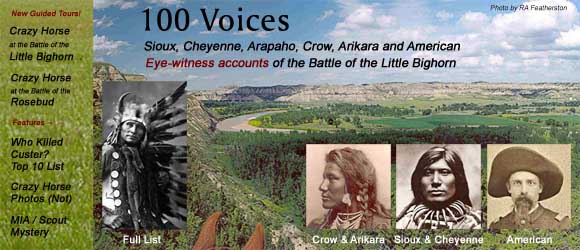
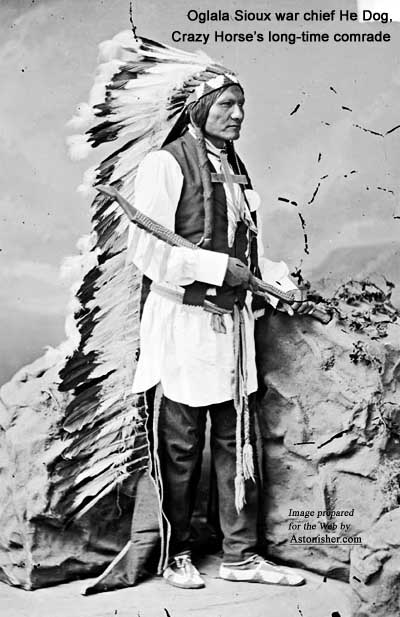 I WILL BE GLAD to tell you about
I WILL BE GLAD to tell you about 